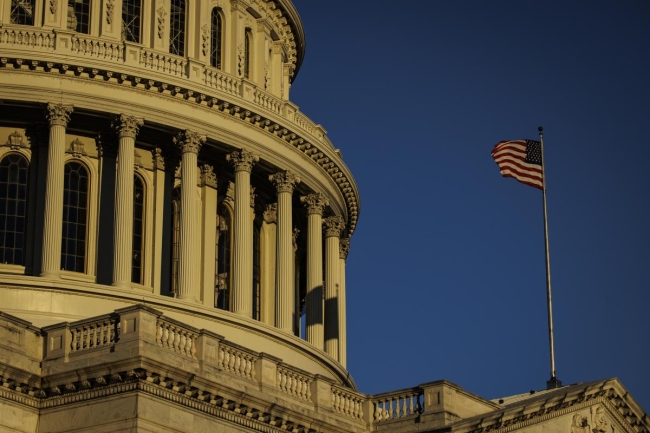You have /5 articles left.
Sign up for a free account or log in.

Congress is back in session and has a long to-do list before the year ends.
Samuel Corum/Getty Images
In the final month of the 117th Congress, lawmakers are hoping to pass an appropriations bill to fund the government for the fiscal year, codify protections for same-sex and interracial marriages, and push through the annual defense reauthorization bill, among other priorities.
Higher education lobbyists are watching the appropriations process closely and would like to see the Senate sign off on an expansion of Pell Grants for short-term programs and the College Transparency Act—both of which passed the House of Representatives in February. The College Transparency Act is aimed at providing students and families with more information about college programs and outcomes by requiring colleges and universities to report certain information. Others are cautiously hopeful that Congress could approve protections for recipients of the Deferred Action for Childhood Arrivals program.
“These are really sympathetic individuals, and by huge numbers the American population wants them to have legal status,” said Jon Fansmith, assistant vice president for government relations at the American Council on Education. “There’s always a chance. Immigration legislation is hard, but it might be easier to do now before we start getting into the presidential election cycle.”
December will be the last month for two years that Democrats control the House, Senate and White House. Republicans will take control of the House in January after winning a small majority of seats in the midterm elections. Many experts and lobbyists don’t think any meaningful legislation will pass during the next two years.
A top priority for Democrats is funding the government. The current continuing resolution funding federal operations expires Dec. 16.
The proposed appropriations bills in the House and Senate include a $500 increase to the maximum Pell Grant award, which is currently $6,895 for the 2022–23 academic year. Higher education associations support that increase and also want to see money to support the CHIPS and Science Act of 2022, which was signed into law in August and called for investments in research and technology.
Craig Lindwarm, vice president for governmental affairs at the Association of Public and Land-grant Universities, said the act authorized science programs “with a goal of enhancing U.S. competitiveness.” However, the act didn’t provide corresponding funding.
“It is an implied promise to come back and provide the needed funding to actually realize the goals of the legislation,” Lindwarm said. “Congress too often in the past hasn’t done that necessary second step. So history cannot repeat itself here, or people will be doomed to failure as to the goals of CHIPS and Science legislation.”
Fansmith said ACE is hopeful that the final appropriations package will include the IGNITE HBCU, TCU and MSI Excellence Act, which would provide money for infrastructure projects at historically Black colleges and universities, tribal colleges and universities, and minority-serving institutions.
Fansmith said the funding level isn’t set yet but could be between $65 million and $225 million.
“We are hopeful for a larger number that comes in at the higher end of the scale, and that it might get attached to appropriations, because that’s money that’s desperately needed by those institutions,” he said.
David Baime, senior vice president of the American Association of Community Colleges, said he’s hoping to see the Jumpstart Our Businesses by Supporting Students Act (JOBS Act) included in a final legislative package. That bill would expand the Pell Grant to cover short-term job training programs.
He’s also focused on making the entire Pell Grant not taxable. Currently, the funds are tax-free if spent on qualified education expenses such as tuition and fees.
“There’s a lot there’s bipartisan support for doing that, so we’re optimistic on that front,” he said.
If the JOBS Act moves forward, other groups are hoping that the College Transparency Act will move as well. Under the bill, colleges would have to provide data to the Department of Education regarding student enrollment, persistence, transfer and completion measures for all programs and degree levels. Then, that information would be made accessible in a user-friendly format to students and families, policy makers, and employers.
This year is a “do or die moment” for the College Transparency Act, said Rachel Fishman, acting director of Higher Education Policy at New America, a think tank.
North Carolina Republican representative Virginia Foxx is one of the bill’s strongest opponents and is expected to lead the House Committee on Education and Labor next year, which Fishman said would make it more challenging to pass the bill. Foxx is currently the committee’s ranking member.
“This is not the first time CTA has gone to Congress,” Fishman said. “It is a very popular bill. It has broad bipartisan and bicameral support in this session of Congress.”
Because Foxx is opposed, other lobbyists think the bill is doomed. Any piece of legislation including a final package likely needs approval from the chair and ranking member of the respective committees in the House and Senate.
“It’s not impossible that it will be included, but it seems hard to believe that it would be included when one of the four corners isn’t supportive and will likely be the chair in a month and a half,” Fansmith said.




